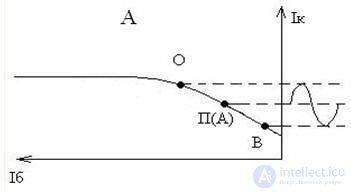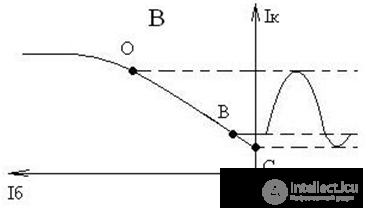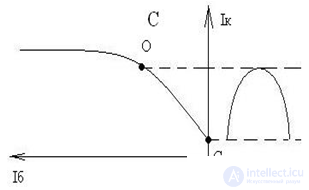Lecture
Electrical Signal Amplifiers
Amplifier Modes
Depending on the position of the operating point on the graphs of the characteristics of the transistor in the quiescent mode (in the absence of a signal at the input), as well as on the magnitude of the signal to be amplified at the input, there are three main modes of operation of the amplifier stages, or amplification classes: A, B and C. The main characteristics of these modes are nonlinear distortion and efficiency.
Mode A is characterized by the fact that the operating point in idle mode is chosen in the middle on the linear section of the input and transient characteristics (dependence of the collector current on the base current). Since in mode A the dependence of the collector current on the base current is almost linear, the nonlinear distortions are minimal. However, due to the fact that the average value of the collector current is much greater than the amplitude of the amplified current, the efficiency of such amplifiers is low, no more than 50%.

Fig. 1 Mode A
The efficiency of the amplifier is determined by the ratio of the output power to the consumption *** measured by the power amplifier from the power source:

where IKm, UKm - amplitude values of the enhanced collector current and voltage; IK0, UK0 - collector current and voltage in the quiescent mode.
In the B mode, the operating point is at the cutoff voltage at the input characteristic (at the beginning of the transient response), Fig. 2.

Figure 2. Mode B implementation scheme
In mode B, the current through the collector flows only in positive half-periods when the emitter-base junction opens. If the input signal is in the form of a sine wave, then the output signal will be in the form of a half sine wave. It is obvious that nonlinear distortions in mode B are very large, however, the efficiency is significantly higher than mode A, since the quiescent current is practically zero. Mode B is typically used in push-pull power amplifiers. Efficiency h = 0.8–0.5.
Mode C differs from mode B in that the operating point in this case is selected at an input voltage that locks the input pn junction to a voltage slightly lower than the amplitude value of the alternating input voltage, Figure 3.

Figure 3 Scheme of implementation of mode C.
Mode C is characterized by the greatest distortions of the amplified signal and the greatest efficiency. It is used mainly in autogenerators.
Comments
To leave a comment
Electronics, Microelectronics, Element Base
Terms: Electronics, Microelectronics, Element Base